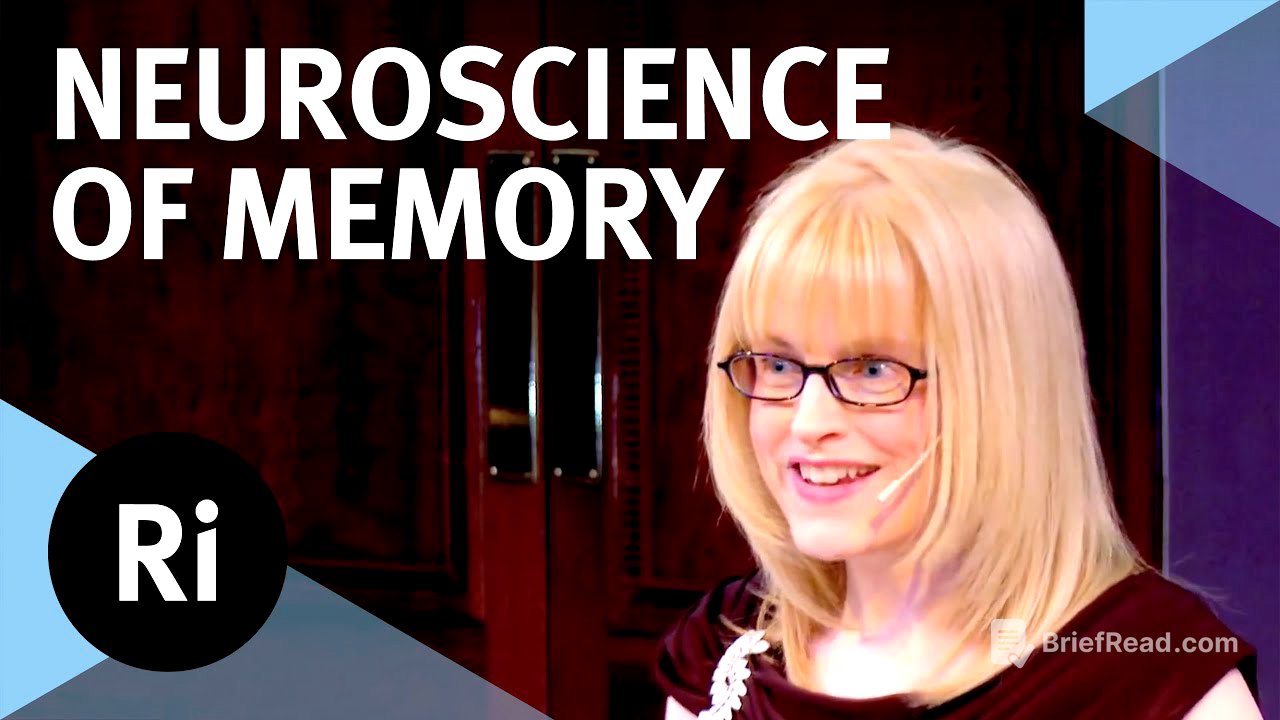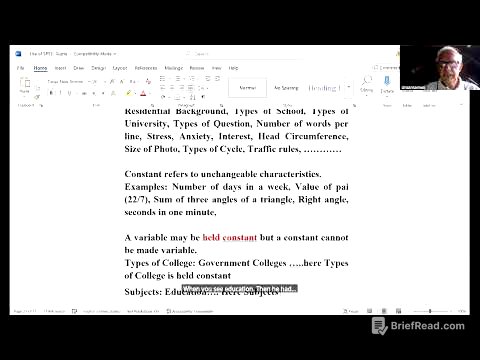TLDR;
This discourse explores the complexities of memory, arguing that it's not a flawless record of the past but a dynamic system crucial for future prediction and survival. It covers different types of memory, the role of the hippocampus in scene construction, and how memory errors like boundary extension are adaptive. The lecture challenges the traditional view of memory as solely past-oriented, highlighting its importance for spatial navigation, imagining future scenarios, and maintaining a continuous experience of reality.
- Memory is not a perfect record of the past but is crucial for predicting the future.
- The hippocampus is essential for constructing scenes, which underpins memory, spatial navigation, and future thinking.
- Memory errors like boundary extension are adaptive, helping us create a seamless and continuous reality.
Introduction: The Brain as a Time and Space Teleportation Machine [0:10]
The speaker introduces the concept of the brain as a device capable of transporting us through time and space, similar to science fiction technologies. This ability stems from the brain's capacity for memory, which is endlessly fascinating and crucial for personal identity and societal cohesion. Memory is not a singular, accurate entity focused solely on the past; instead, it is multifaceted, context-dependent, and somewhat inaccurate, enabling mental time travel and spatial navigation.
Different Types of Memory [2:36]
Memory is not a unitary phenomenon but comprises different types, including short-term memory for immediate information, long-term memory for skills and habits, and episodic or autobiographical memories for personal experiences. Damage to specific brain areas selectively impacts these memory types. For instance, classic amnesia impairs the formation of new memories and the recall of past experiences, while certain dementias primarily affect memory for facts and concepts, leaving autobiographical memories intact, at least initially.
The Importance of Context in Memory [4:45]
Memory functions more effectively when it occurs within a context, drawing upon prior knowledge to link incoming information with existing understanding. An experiment involving memorising text, either with or without an accompanying scene, demonstrates that subjects who saw the scene performed better on the memory test. This highlights the importance of context in enhancing memory recall.
Memory is Fallible: A Memory Test [6:57]
A memory test is conducted, where participants view a picture flashed briefly on the screen, followed by a second picture, and must determine if the second picture is closer up, the same, or further away. The results reveal that a significant portion of participants incorrectly perceive the second picture as closer up, even when it is identical to the first. This demonstrates that memory is not a faithful record of the past and is prone to errors, even over short intervals.
The Benefits of Forgetting and Superior Autobiographical Memory [12:05]
While forgetting is often lamented, it serves a crucial purpose. Individuals with highly superior autobiographical memory, who never forget anything, illustrate the drawbacks of remembering everything. These individuals can recall minute details of past events, which can be overwhelming and undesirable. Normal forgetting is beneficial.
The Brain and Memory: The Role of the Hippocampus [14:12]
The study of the brain's role in memory gained momentum with patient H.M., who suffered from intractable epilepsy and had his temporal lobes removed. This resulted in dense amnesia, preventing him from forming new memories and impairing his recall of the past. H.M.'s case highlighted the importance of the hippocampus, located in the temporal lobe, in autobiographical memory.
Spatial Memory and the Hippocampus [19:05]
Research in the 1970s revealed that the hippocampus contains place cells, which respond to specific locations in the environment, embodying the memory of those places. Studies on spatial memory in humans, using a virtual navigation video game set in London, showed that the hippocampus is activated during route planning. Further research with a patient who had hippocampal damage and was a former taxi driver demonstrated the critical role of the hippocampus in spatial navigation.
The Hippocampus and Scene Construction [28:27]
Patients with hippocampal damage struggle not only with recalling the past and navigating but also with imagining future experiences and constructing simple scenes. When asked to imagine a scene, their descriptions are fragmented and lack coherence compared to those of healthy controls. This suggests that the hippocampus is essential for scene construction, facilitating the creation of complex spatial contexts that underpin memory, imagination, and spatial navigation.
Boundary Extension: How We Extrapolate Beyond What We See [35:19]
An experiment involving volunteers drawing a picture of bananas reveals the phenomenon of "boundary extension," where people include more space around the objects than was present in the original image. This occurs because we automatically extrapolate beyond the borders of what we see, incorporating prior knowledge into our mental representation of the scene. Patients with hippocampal damage show reduced boundary extension, indicating that they are less able to imagine what's beyond the immediate view.
Memory's Purpose: Predicting the Future [45:15]
Memory is not primarily about the past but about the future, helping us predict and infer what to do next based on previous experiences. The hippocampus and the brain as a whole serve the purpose of survival by enabling us to anticipate and navigate future scenarios. Memory works best in the context of our prior knowledge, and its errors are adaptive, allowing us to embed our experiences into a wider spatial framework.
Future Directions in Memory Research [47:16]
Future research aims to further explore the processes and mechanisms underlying memory, examining memory traces and how they change with age and in the context of brain injury and disease. High-resolution functional MRI scanning and new decoding algorithms are being used to predict an individual's location in a virtual reality environment and to identify specific memories they are recalling.
Questions and Answers [49:13]
The Q&A session addresses various topics, including the implications of the memory test results, the role of the brain in creating mental pictures through words (as in novels), the prevalence of highly superior autobiographical memory, and the emotional impact of memory loss. Additional questions explore the multi-modal nature of scenes, the function of place cells in creating memories, and the relationship between the hippocampus and the sense of self across species. The session also touches on learning styles and individual differences in visualisation abilities, as well as the mapping of place cells in different rats within the same environment.









